Key Takeaways
- 57% of Americans over 55 have used ChatGPT.
- More than 1 in 10 people over 55 would trust AI to suggest medication dosages.
- Seniors would pay the most for an AI conversation app, an average of $9 per month.
Bringing AI to Seniors
Artificial intelligence (AI) is rapidly developing, with scores of new AI products, software, and tools used to simplify daily tasks. With this innovation, AI has the potential to substantially increase the quality of life for seniors, providing them with independence that may otherwise be difficult to gain.
We surveyed 1,000 Americans over 55 regarding their thoughts on AI, current AI usage, and interest in hypothetical AI senior care apps. Let’s explore our findings.
The Current State of AI Usage
Some seniors can feel intimidated by new technologies, but many are already using AI for personal and professional use. Let’s discover how older adults incorporate AI into their daily lives.
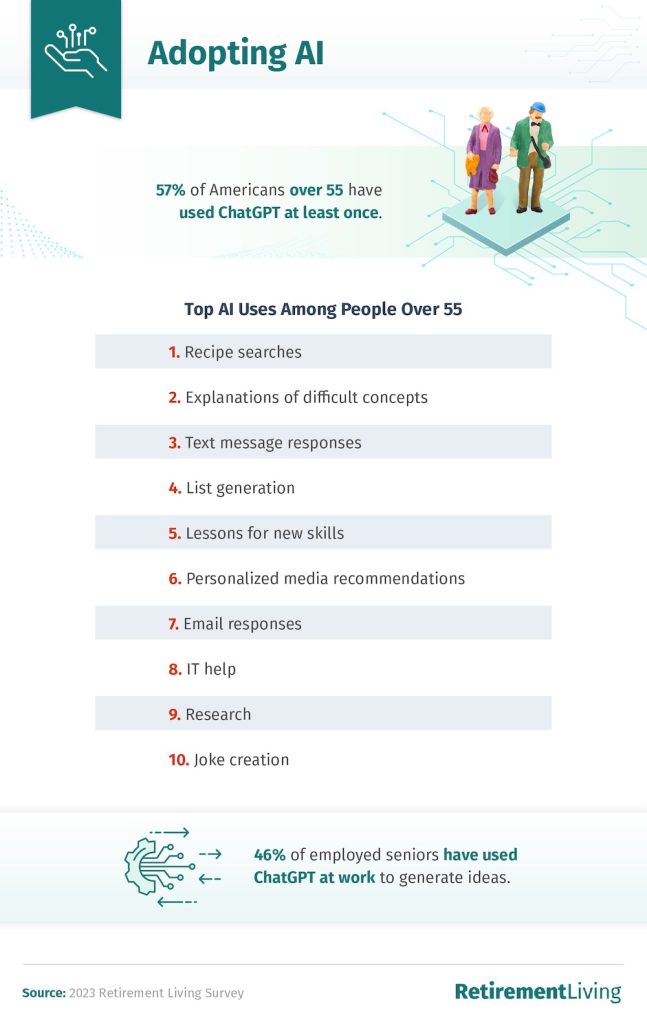
Over 57% of seniors reported using ChatGPT at least once to see what it was all about. Seniors also embraced AI professionally, as 46% used AI for idea generation at work. Seniors most often used AI to find recipes, understand difficult concepts, and draft text message responses. Others used it to learn new skills, get personalized media recommendations, and help write jokes: Why did AI go on a diet? Because it had too many bytes.
Tools of the Future
Senior living can be very fulfilling, but it comes with unique challenges. Almost half of the older adults we surveyed experienced boredom at least once each week, and roughly one-third struggled with loneliness, anxiety, and brain fog. Other experiences and feelings reported by senior respondents included:
- Forgot someone’s name (66%)
- Wanted more meaningful conversations (61%)
- Wanted to talk to someone without leaving home (49%)
- Forgot to take medicine (40%)
- Needed more knowledge of personal health (40%)
- Forgot important dates (39%)
AI innovations could help seniors manage these experiences and remain more independent. To explore the possibilities of AI in daily senior living, we generated five hypothetical AI apps to help with news, health tracking, daily organization, games, and conversation. We then presented the apps to seniors and asked about their interest in using these tools.
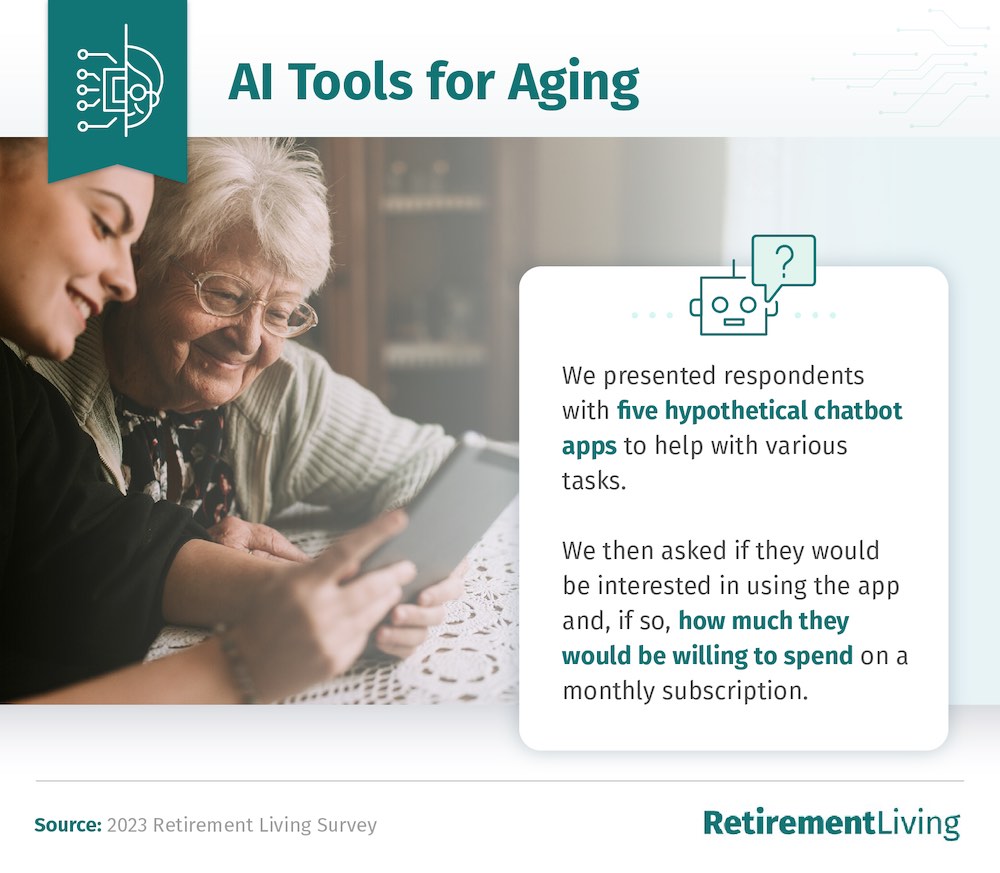
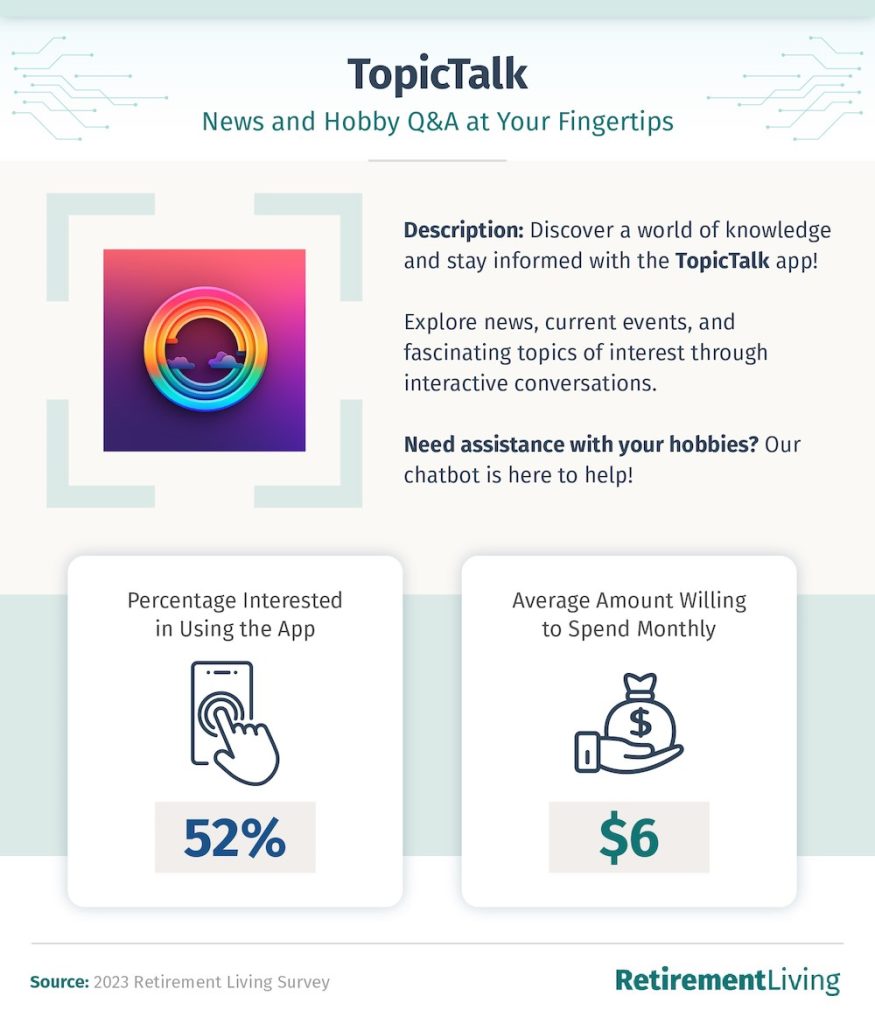
TopicTalk, a conversational news and information app, was one of the most popular AI tools; 52% of respondents expressed interest in using it. On average, seniors said they would pay $6 monthly for this app.
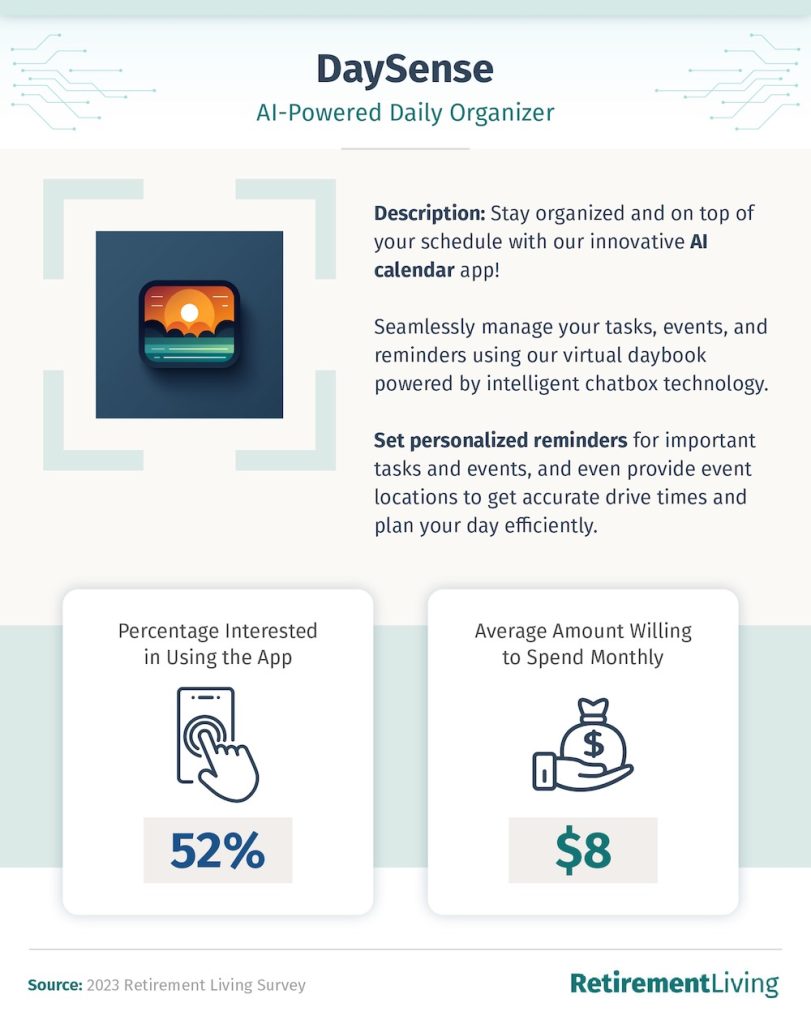
DaySense, an AI assistant and daily organizer app for reminders, also had a positive response. Over half (52%) of seniors were interested in the app and would pay around $8 monthly to use it.
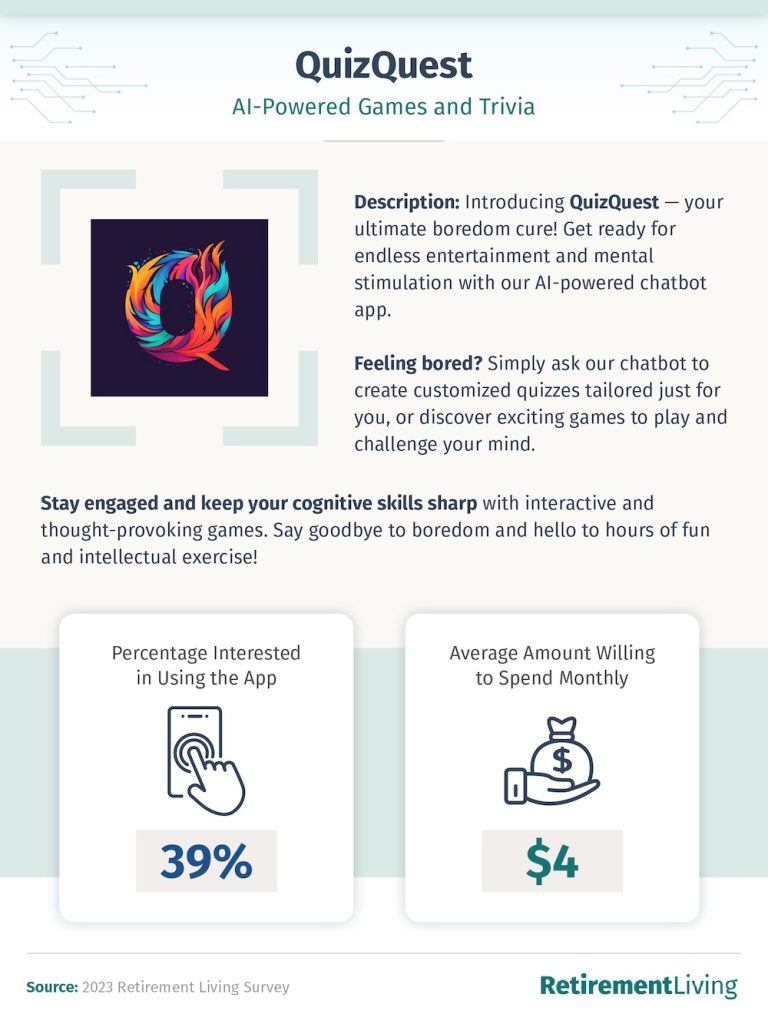
QuizQuest, the AI entertainment app providing games and trivia, was slightly less popular. Only 39% of respondents were interested in engaging with this app and valued it at just $4 per month, the lowest payment amount among all five apps.
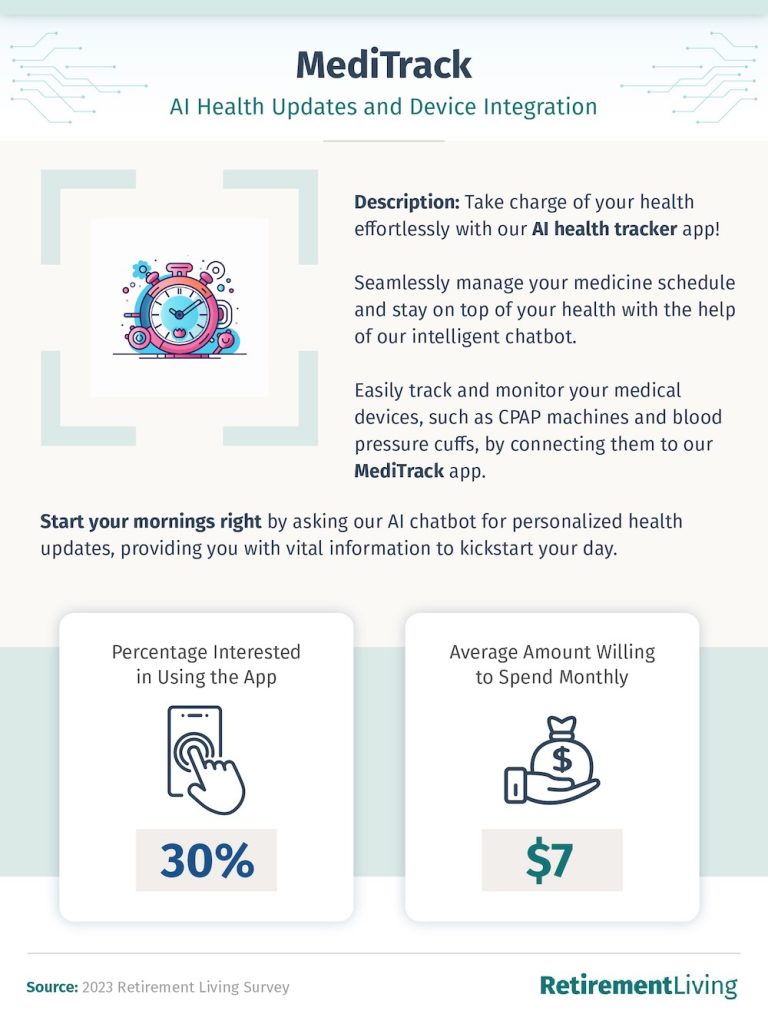
Seniors weren’t very trusting of MediTrack, a healthcare tracking tool, as only 30% were willing to use it. On average, respondents said they would pay $7 per month for this AI app.
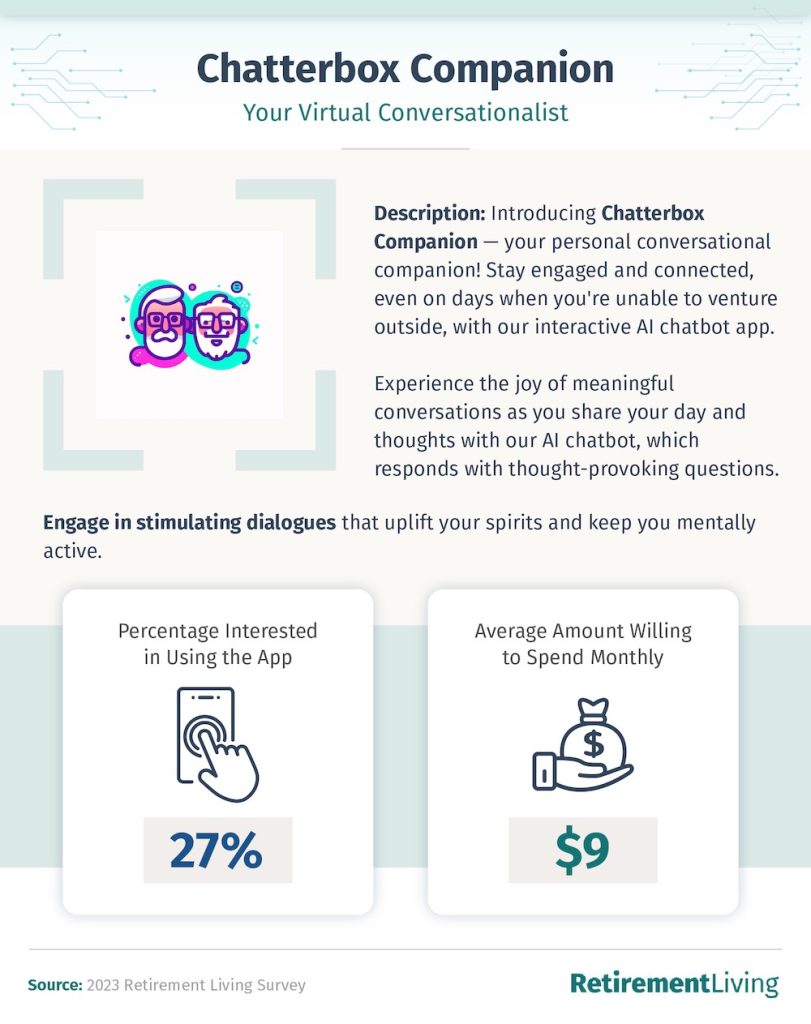
Chatterbox Companion, the virtual conversation and interactions app, was the least popular app among respondents. It garnered the least interest at just 27% but—interestingly—was valued the highest at $9 per month.
Senior Trust and AI Safety
With the potential for life-changing AI tools comes the question of trust and the dangers of new technology. How do seniors feel about trusting AI with aspects of their daily lives?
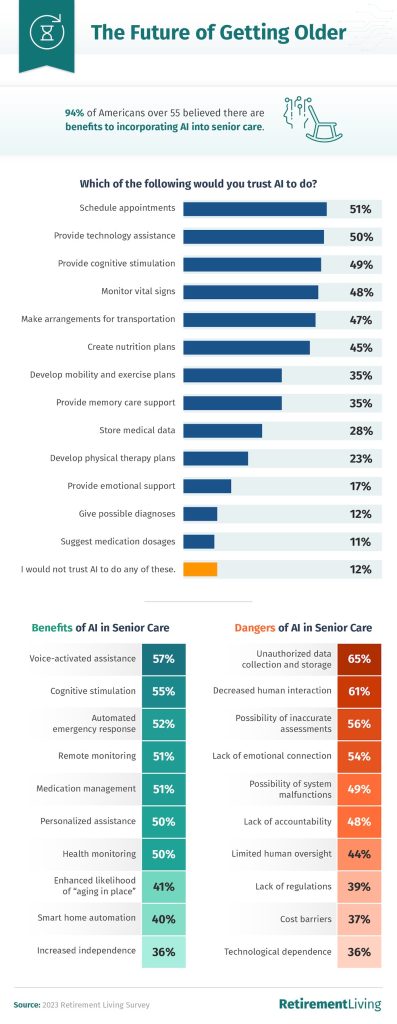
An outstanding 94% of Americans over 55 believed AI would benefit senior care. Respondents were willing to trust AI with simple tasks like scheduling appointments (51%), technological assistance (50%), and providing cognitive stimulation (49%). Seniors were far less likely to trust AI with more critical tasks like providing emotional support (17%), offering medical diagnoses (12%), or suggesting medication dosages (11%).
Older adults saw many benefits to AI in senior care, including voice-activated assistance (57%), cognitive stimulation (55%), and automated emergency response (52%). Over 2 in 5 older adults also believed AI could improve their ability to age in place, and 1 in 4 thought it could help with at-home dementia care. The benefits of AI in senior care also extended to caregivers; 31% of seniors felt AI could offer caregiver support, and 29% believed it could improve care coordination.
However, there were also several concerns regarding AI in senior care. The biggest concern was unauthorized data storage and collection (65%), which can be especially sensitive as it relates to private medical information. Seniors were also apprehensive about decreased human interaction (61%) and lack of emotional connection (54%). Many older adults also expressed unease over some broader dangers of AI, including ethical dilemmas (31%), difficulty of use (29%), and bias and discrimination (24%).
Despite these concerns, only 12% of respondents said they would not trust AI with daily tasks.
A New Era for Senior Care
AI has the power to improve senior care significantly. Almost all older adults recognize the potential benefits of AI and are interested in using it to counteract common aging experiences and help with daily tasks. With tested integrations and real human oversight, AI tools could bring senior care into a new era, enabling independence and making retirement even more fulfilling.
Methodology
We surveyed 1,000 Americans over 55 about their AI usage, what AI tools they might be interested in seeing in the future, and how much they trust AI in senior care. We also used ChatGPT, 11Labs, and Midjourney to create potential AI tools, including logos, descriptions, and sample audio.
About Retirement Living
Retirement Living is dedicated to providing resources, information, and products to help those in retirement enjoy a healthy, active, and secure lifestyle. Our mission is to empower retirees with knowledge, resources, and a deeper understanding of their options so they can make informed decisions about retirement living.
Fair Use Statement
If you found this information on AI in senior care interesting, please share it with anyone you’d like for noncommercial purposes only; you must provide a link back to this article so readers can access our full findings and methodology.
